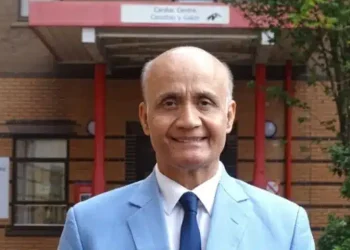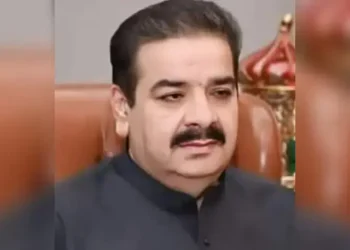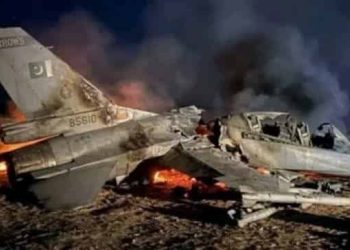Hezbollah leader was killed by an Israeli strike on Beirut – what does this mean for the Lebanese group?
Hezbollah’s leader for the past 32 years, Hassan Nasrallah, has been killed in an Israeli air strike on Lebanon’s capital Beirut on Friday evening.
Ali Karki, the commander of Hezbollah’s southern front, and other Hezbollah commanders were also killed in the massive air attack on Beirut’s southern suburb of Dahiyeh, the Israeli military claimed.
Just more than a week ago, Israel also killed senior Hezbollah commander Ibrahim Aqil in Beirut. These events come just two months after Hamas’s political bureau chief, Ismail Haniyeh, was killed by Israel in Iran.
The deaths of Nasrallah and other leaders in these unprecedented attacks on Lebanon and during the mass detonation of pagers and handheld radios belonging to Hezbollah commanders earlier this month have left the group facing a potential power vacuum.
Israel has claimed this as a huge victory, but observers fear an escalation in the conflict between Israel and Iran, backs Hezbollah. So what will happen next?
Nasrallah, 64, became Hezbollah’s third secretary-general in 1992, after his predecessor, Abbas al-Musawi, was killed by Israeli missiles.
Hezbollah (Party of God in Arabic) is an Iran-backed group formed in 1982 to fight Israel’s occupation of southern Lebanon. It finds most of its support among Shia Muslims.
Nasrallah reached the peak of his popularity in Lebanon and beyond in 2006 after a war with Israel. His speeches, which combined political and religious elements, also contributed to his widespread appeal.

Hezbollah’s seven-to-eight-member shura council is expected to convene to decide who will now lead the party.
Hashem Safieddine, head of Hezbollah’s executive council, is believed to be among the choices as the group’s new secretary-general.
As executive council head, Safieddine oversees Hezbollah’s political affairs. He also sits on the Jihad Council, which manages the group’s military operations, and is Nasrallah’s maternal cousin.
Who was Hassan Nasrallah?
Following Israel’s recent pager explosions, Safieddine said Israel had initiated a “new confrontation” and the response to the attack would be a “special punishment”.
In a statement on Saturday, in which it confirmed the death of Nasrallah, Hezbollah said it would continue its military operation in support of Gaza and the defence of Lebanon.
Beirut is considered to be Hezbollah’s “weakest point” as it is also where Western embassies and people who are affiliated with Western intelligence agencies are, said Mohammad Marandi, a professor at the University of Tehran. Overall, however, “Israel does not have the capability to defeat Hezbollah militarily”, Marandi told media.
Analysts say the group now faces strategic choices amid a temporary leadership vacuum rather than a full blow to its survival.
“Hezbollah is not going to disappear,” said Yezid Sayig, senior fellow at the Carnegie Middle East Programme. It will “exercise strategic patience” even if Iran does not sweep in to defend them now, he added.
Experts do believe, however, that Hezbollah has made other mistakes that have weakened it relative to Israel.
“The big mistake that Hezbollah has made is to allow the Iranians to use them too much as a proxy,” said Sultan Barakat, senior professor in public policy at Hamad Bin Khalifa University. “Hezbollah were very effective when they fought for the liberation of the Lebanese land – for their own people.”
For the last year, however, Iran has given them little agency around how to use weapons they were given, while the group has miscalculated how much violence Israel is willing to exert, not just on the people of Gaza, but on the Lebanese people as well, he told media.
At the UN General Assembly in New York on Friday – before the latest strikes – Israeli Prime Minister Benjamin Netanyahu had one main message when he told members: “We are winning.” Israel is claiming this devastating assault on Hezbollah as a major victory.
Experts largely agree that Israel will continue on the offensive.
“Israel views it has momentum on its side following Nasrallah’s death and would want to take maximum advantage of a leadership vacuum,” Ali Rizk, a security and policy analyst, told media on Saturday.
The perceived success of its assault on Hezbollah may also sway domestic public opinion in Netanyahu’s favour, according to Mohamad Elmasry at the Doha Institute of Graduate Studies.
“Israelis who were opposing Netanyahu were opposed to his failures in Gaza, not being able to eliminate Hamas and not being able to bring hostages home, but they were not an antiwar crowd,” Elmasry said.










 American Dollar Exchange Rate
American Dollar Exchange Rate